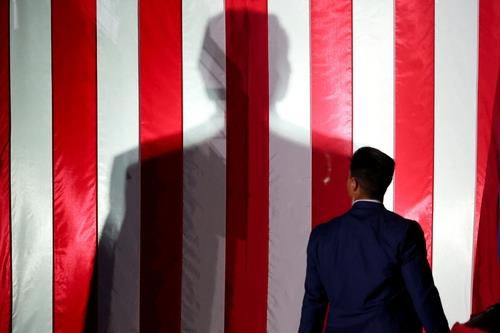KOSPI returns ranked 83rd among the world’s 92 major indices after the US presidential election
All major Asian indices fell on the 12th.
<img src="https://img1.yna.co.kr/etc/inner/KR/2024/11/12/AKR20241112136400009_01_i_P4.jpg" alt="Former President Donald Trump‘s shadow reflected on the American flag at the US presidential election campaign site “/>
Former President Donald Trump’s shadow reflected on the American flag at the US presidential election campaign site
[로이터 연합뉴스. 재판매 및 DB 금지]
(Seoul = Yonhap News) Reporter Cha Byeong-seop = Although the U.S. stock market is rallying to new highs after former U.S. President Donald Trump succeeded in returning to power, the domestic stock market is showing a noticeable slump even among the world’s major stock indices.
According to Bloomberg News on the 12th (local time), as a result of comparing the returns of the world’s major stock indices from the market close on the 5th of this month, the day of the US presidential election, to the 11th, KOSPI fell 1.75% and ranked 83rd among 92 indices.
There were nine indices that had lower returns than the KOSPI during this period, including the Philippine Composite Index (-4.38%), the Jakarta Composite Index in Indonesia (-3.01%), the Hang Seng Index in Hong Kong (-2.76%), and indices in Brazil and Spain.
advertisement
While the possibility of strengthening US sanctions against China was discussed in the semiconductor sector, Samsung Electronics (-4.51%), the leading domestic market capitalization company, showed a sluggish trend during this period, weighing down the index.
On the other hand, in the New York stock market during the same period, the Dow Jones Industrial Average rose 4.91%, ranking 4th, and the Standard & Poor’s (S&P) 500 Index rose 3.78%, ranking 6th.
The 1st and 2nd places were the ‘Borsa Istanbul Stock Exchange National 30 Index’ (+7.98%) and the ‘Borsa Istanbul National 100 Index’ (+7.64%) of the Turkye Stock Exchange, and the 3rd place was the ‘Cyprus Stock Exchange General Index’. It was (+6.62%).
During this period, amid the rise in the yen/dollar exchange rate due to the strength of the dollar, Japan’s Nikkei 225 average stock price (Nikkei) rose 2.75% and ranked 13th.
Among the three major indices in the New York stock market, the Dow closed at 44,293.13, up 0.69% on the 11th, exceeding the 44,000 mark as the closing price for the first time in history, and the S&P 500 index also exceeded the 6,000 mark for the first time.
In addition to indices, in the United States, assets that have been considered so-called ‘Trump beneficiary stocks’ such as Bitcoin and Tesla stock since the presidential election are continuing to soar.
On the 11th, the price of Bitcoin soared by about 10% in one day, exceeding $89,000 for the first time in history, and the stock price of Tesla, led by CEO Elon Musk, a ‘top contributor to the presidential election’, also rose by nearly 9% in one day. .
Meanwhile, major Asian indices, including KOSPI, all fell on the 12th.
On this day, while semiconductor stocks such as Samsung Electronics (-3.64%), SK Hynix (-3.53%), and Hanmi Semiconductor (-3.86%) showed weakness, KOSPI closed at 2,482.57, down 1.94%. It has dropped to 2,500 points in about three months since ‘Black Monday’ last August.
Despite the government’s push for value-up (enhancement of corporate value) policy, KOSPI fell 6.5% so far this year.
Among the 26 major stock indices in the Asia-Pacific region provided by Bloomberg, the only ones whose stock prices fell compared to the beginning of the year are KOSPI and KOSDAQ (-18.01%).
On this day, the Nikkei (-0.40%), Taiwan’s Jiquan Index (-2.33%), the CSI 300 Index (-1.10%) and the Shanghai Composite Index (-1.39%), which are comprised of the top 300 stocks in China’s Shanghai and Shenzhen stock markets by market capitalization, also fell. .
As of 4:17 p.m. Korean time, Hong Kong’s Hang Seng Index is down 3.09%, and the Hong Kong H Index (HSCEI), which consists of mainland Chinese companies listed in Hong Kong, is down 3.33%.
Bloomberg interpreted that Asian stock markets showed weakness on this day due to concerns about the realization of President-elect Trump’s tariff pledge and deepening conflict between the U.S. and China following the selection of the next U.S. cabinet.
Previously, an official in the financial investment industry said, “If policies such as tax cuts and enhanced benefits for domestic companies are implemented after Trump returns to power, the U.S. stock market will receive further strength,” adding, “In this case, the incentive to leave the domestic stock market and increase overseas investment will increase.” “It can be done,” he predicted.
Report via KakaoTalk okjebo
Unauthorized reproduction/redistribution, AI learning and use prohibited>
2024/11/12 17:01 Sent


